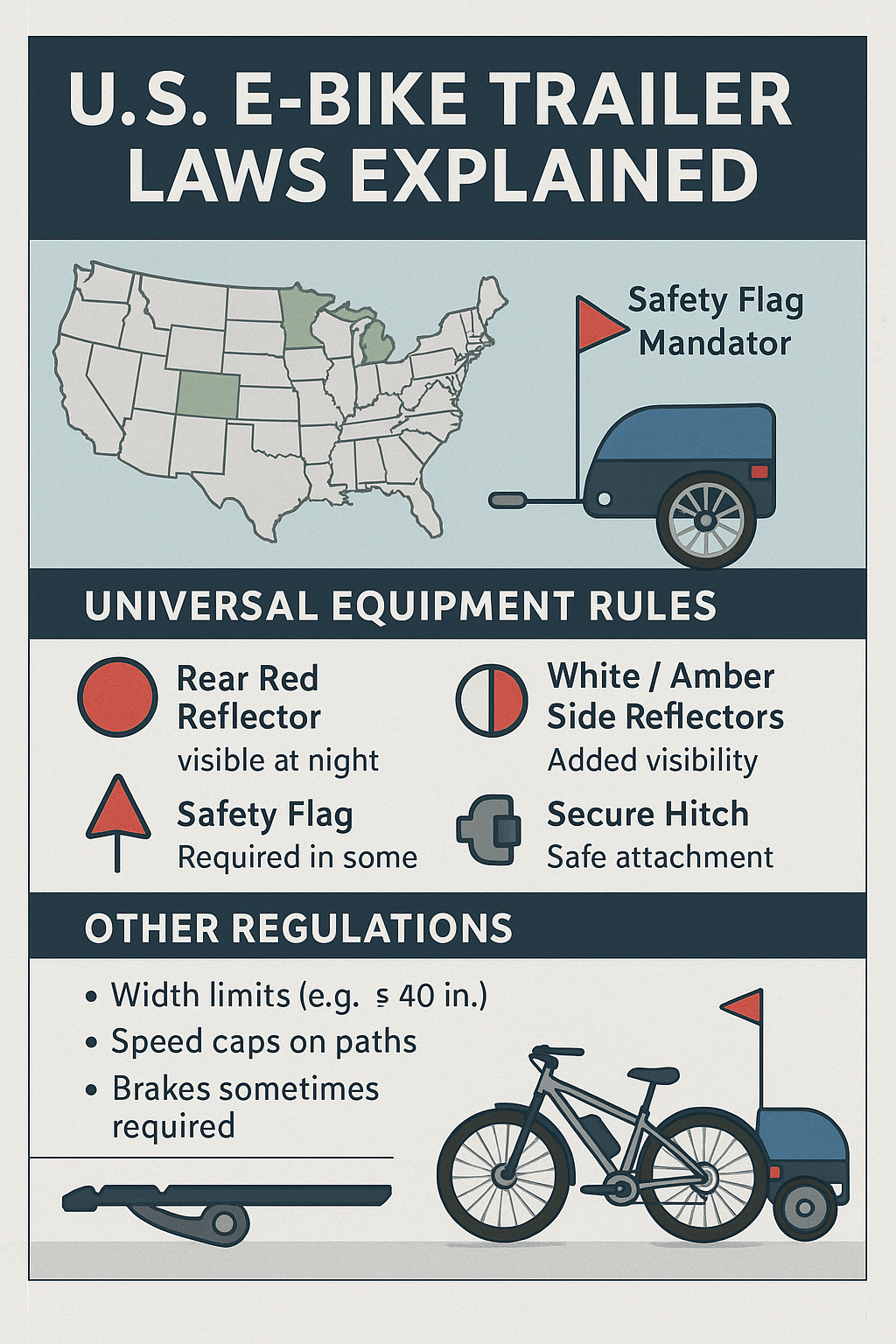
U.S. E-Bike Trailer Laws Explained
Table of Contents
Introduction
Between grocery runs and weekend camping, an e-bike trailer turns two wheels into a mini pickup truck. Yet misjudge the rules and you could face a roadside ticket—or worse, an insurance denial after a crash. Trailer laws live in a gray zone: the federal government sets almost no standards, leaving the 50 states (and a few big cities) to fill the gaps. Use this guide to decode the essential regulations—then tow with confidence.
1 | Federal vs. State Authority
-
Federal: The Consumer Product Safety Commission (CPSC) classifies e-bikes (≤ 750 W, ≤ 20 mph throttle) but says nothing about the trailers they tow.
-
State & Local: Lighting, flag, width, and braking rules come from each state’s vehicle code—and sometimes from counties or parks departments.
Key takeaway: Always start with state law, then check city ordinances for paths and boardwalks.
2 | Universal Equipment Rules Most States Share
| Requirement | Typical Standard | Why It Exists |
|---|---|---|
| Rear red reflector | Visible 500 – 600 ft at night | Makes a low trailer visible after dark. etrailer.com |
| White or amber side reflectivity | Reflective material or spoke reflectors | Alerts cross traffic in intersections. colobikelaw.com |
| Safety flag | Orange/red, 5 ft off ground | Required in WA, OR, MN; recommended elsewhere for daytime visibility. |
| Secure drawbar/hitch | Must “prevent whipping or weaving” | RCW 46.44.070 in Washington is typical wording. app.leg.wa.gov |
3 | State Highlights & Quirks
| State | Width / Length Limit | Lighting & Flag | Braking Requirement | Notes |
|---|---|---|---|---|
| California | No explicit width; trailer >1 500 lb needs brakes. dmv.ca.gov | Red rear reflector + front lamp on tow bike. calbike.org | ≥1 500 lb GVW must have independent brakes. | Heavily enforced on Pacific Coast Highway. |
| Colorado | Mirrors bike-lighting law: white front light, red rear reflector visible 600 ft. colobikelaw.com | No state-wide width cap. | None for <2 000 lb. | Many cities mandate 4 ft max overhang. |
| Minnesota | Max width 36 in on shared-use paths (Park & Trail rules). | Orange safety flag required on state trails. | None <1 500 lb. | Popular on Mesabi Trail—rangers check flags. |
| Oregon | Path rules cap width at 40 in; flag strongly recommended. oregon.gov | State traffic code mirrors bike reflector rules. | None. | Trailer + bike counted as a single “vehicle.” |
| Florida | No dedicated trailer statute; general bike rules apply. flbikelaw.org | Rear red reflector mandatory at night. | None. | Miami-Dade bans trailers on Ocean Dr boardwalk. |
| New York City | DOT caps overall width at 36 in on greenways; trailer must not impede pedestrians. nyc.gov | Rear reflector + flag at night. | None. | NYPD occasionally enforces width with tape measure. |
4 | Weight, Speed & Braking Basics
-
Rule of thumb: Keep trailer + cargo under 40 % of your e-bike’s weight rating for safe handling.
-
Brakes: Only five states (CA, NV, ID, MT, UT) require trailer brakes, and only when gross weight tops 1 500 lb—well above most cargo trailers. dmv.ca.gov
-
Speed caps: Your e-bike class rules still apply—20 mph (Class 2 throttle) or 28 mph (Class 3 pedal-assist). Many state parks restrict any trailer-equipped bike to 15 mph on multi-use paths.
5 | Where You Can (and Can’t) Tow
| Facility | Allowed?* | Details |
|---|---|---|
| Bike lanes on public roads | ✅ In all states | Trailer must stay within lane markings. |
| Shared-use paths | ⚠️ Varies | Width and speed caps common; check local signage. |
| Sidewalks | ❌ or ⚠️ | Most states bar bikes with trailers on sidewalks; ADA exception for mobility trailers. |
| State & National Parks | ✅ with rules | Rangers can ticket for missing flag or exceeding posted speed. |
*Unless local ordinances say otherwise.
6 | Cross-State Trip Checklist
-
Measure width at widest point; keep ≤ 36 – 40 in to satisfy every state.
-
Install a 6 ft whip flag—cheap insurance against daytime citations.
-
Carry spare hitch pin & coupler; many roadside failures are pin-related.
-
Pack a printed copy of lighting statutes for your destination states—helps if stopped by an officer unfamiliar with e-bike gear.
Top Road-Trip Accessories for Electric Bikes
Key Takeaways
-
No nationwide rule set exists—state traffic codes fill the gap.
-
Virtually every state demands a rear reflector; many require or strongly advise a safety flag.
-
Keep trailer width under 36 – 40 in to remain legal on multi-use paths from NYC to Oregon.
-
Trailer brakes matter only if you’re hauling motorcycle-level weight (> 1 500 lb).
-
Always check city ordinances for beach boardwalks and greenways before your trip.
Frequently Asked Questions
Q: Do I need a license plate for my e-bike trailer?
A: No U.S. state currently requires plates on non-motorized bicycle trailers.*
Q: Are child trailers legal on sidewalks?
A: Generally not—sidewalk riding with any bike trailer is prohibited in most states’ vehicle codes, although some cities allow it for children under a certain age.*
Q: Can I tow a trailer with a Class 3 (28 mph) e-bike?
A: Yes, but many parks cap speed at 15 mph when towing. Exceeding posted limits can lead to fines or trail bans.*
Q: Is a safety flag mandatory everywhere?
A: Required in WA, OR, MN, parts of CA; strongly recommended elsewhere for visibility.*
Q: Will trailer weight void my e-bike warranty?
A: Some manufacturers set a maximum gross load (bike + rider + trailer). Exceeding it can void warranties—check your owner’s manual.*
No comments











0 comments